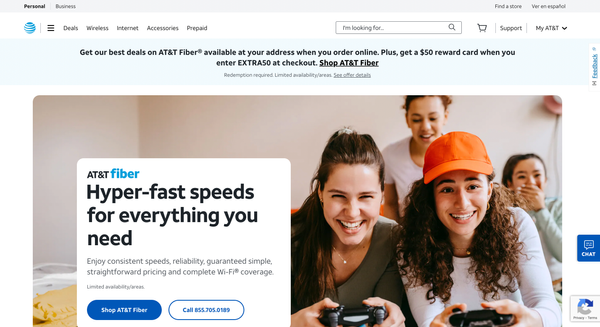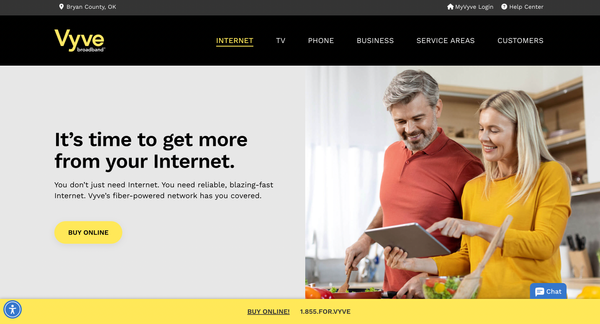In the digital age, we're more connected than ever. But with so many options, finding the right cable internet provider can feel like navigating a maze. We're here to help you understand the landscape and make an informed choice.
From speeds to service reliability, there's a lot to consider. It's not just about price, but about getting the most value for your money. So, let's dive in and demystify the world of cable internet providers together.
Stay tuned as we explore the key factors you need to keep in mind when choosing your cable internet provider. Whether you're a casual surfer or a heavy streamer, we'll guide you in finding the perfect fit for your needs.
Understanding Cable Internet
Before diving into the pool of various cable internet providers, it's critical to grasp the basic concept of how cable internet works and why it is often a better choice over other types. Let's delve a little deeper to wipe away any smudged lines.
How Does Cable Internet Work?
Cable internet is essentially the transmission of data via the same cables that deliver cable television right to your living room. The process initiates with your modem converting an Internet signal from the provider into something your devices can utilize. The Internet Service Provider (ISP) delivers data through coaxial cable lines, before your modem receives it, converts it, and then sends it onto your connected devices, like your computer, tablet, or smartphone.
Why Choose Cable Internet Over Other Types?
Well, several reasons make cable internet a worthy choice for internet seekers. For one, it's much faster than traditional DSL with consistent speeds that don't fluctuate, even during peak usage times. This means seamless streaming, efficient online gaming, and zero buffering with those Zoom calls for remote work. Secondly, it's readily available as cable TV lines already exist in most residential areas. Lastly, most cable internet providers offer bundled services such as TV and phone services with the internet, making it a cost-effective choice. In essence, it's a package of optimum speed, availability, and value for money - a combo hard to resist.
Top Cable Internet Providers in the US
As we continue to ride the information superhighway, let's shift our focus to the top contenders in the sphere of cable internet in the US. Here, we'll be sizing them up against each other for an in-depth look into what makes them tick.
Overview of Service Providers
When you're talking about dependable cable internet providers in the USA, few names carry as much weight as Comcast Xfinity, Charter Spectrum, and Cox Communications. These providers are not only renowned for their wide coverage and impressive speed tiers but also their customer service and overall reliability.
- Comcast Xfinity: Comcast Xfinity is currently the largest cable internet service provider in the US. They offer a variety of plans that cater to various needs and budgets. Xfinity also boasts some of the highest speed tiers in the industry, with their Gigabit Pro service reaching mind-boggling speeds of up to 2,000 Mbps.
- Charter Spectrum: Spectrum is widely known for their contract-free plans and uniform pricing across different states. They offer three basic speed tiers, with their top package giving a respectable 940 Mbps bandwidth.
- Cox Communications: Cox is another provider that is well received for its service and performance, despite being smaller compared to the other two giants. They deliver speed tiers ranging from 10 Mbps to a substantial 1,000 Mbps.
Individual Reviews of Top Providers
Let's now delve deeper into the specifics of each provider.
- Comcast Xfinity: Being the biggest doesn't necessarily mean the best, but with Xfinity, their superior coverage and impressive speed tiers are undeniable. They also offer bundled plans, providing great value for those looking for a one-stop source of home services.
- Charter Spectrum: Spectrum becomes a favorite mostly because of its straightforward, contract-free approach. You also get added benefits such as free modem and anti-virus with their plans, which makes it an attractive deal for users.
- Cox Communications: Although Cox might not have the coverage like Xfinity or offer contract-free plans like Spectrum, they hold their own with competitive pricing and great customer service. Their Panoramic Wi-Fi service, in particular, ensures consistent coverage, proving that they can deliver when it counts.
Features and Benefits of Cable Internet
In the rapidly evolving digital world today, having a stable internet connection is crucial, and cable internet provides just that. This section will delve into the primary features and benefits of cable internet.
High Speed Internet Service
One of the standout features of cable internet is its speed. Competing favorably with other types of connections, cable internet can easily offer speeds ranging from 20 Mbps to a whopping 1000 Mbps. This means you can seamlessly stream videos, play online games, and participate in video calls without worry. For instance, Comcast Xfinity's high-speed plans offer up to 1200 Mbps, ensuring uninterrupted and super-fast internet.
Constant Connectivity
Promising constant connectivity, one of the chief advantages of cable internet is its reliability. Unlike some other types of internet connections, cable internet does not suffer from weather-related disruptions, ensuring an uninterrupted online experience. Cable internet uses the same cable that brings TV signals into your home - this ensures a stable and consistent internet connection, regardless of external conditions. A great example is Cox Communication's Panoramic Wi-Fi, renowned for reliability, ensuring your online activities run smoothly, anytime, anywhere.
Comparing Cable Internet Providers
Following our in-depth overview of the top cable internet providers, let's delve into a comparative analysis between them. This will facilitate better understanding of their unique selling propositions in terms of speed, performance, and pricing.
Speed and Performance Comparison
When it comes to speed and performance, differences emerge among Comcast Xfinity, Charter Spectrum, and Cox Communications. Comcast Xfinity leads the pack, boasting its Gigabit Pro plan offering unrivaled speeds up to 2000 Mbps. On the other hand, Charter Spectrum offers a consistent and reliable speed of 200 Mbps across all plans, topping out at 940 Mbps for its Gig plan. Cox Communications, while not providing the highest speeds, wins on consistency, especially popular with its Panoramic Wi-Fi feature ensuring steadfast connectivity.
Pricing and Plan Comparison
Pricing models differ among the three providers as well, catering to a range of budgets and needs. Comcast Xfinity's extensive range of plans kick off at $29.99/month, scaling up to $299.95/month for its highest-tier package. Charter Spectrum follows a more simplified model, with no-contract plans starting at $49.99/month and reaching $109.99/month for the premium tier. It also wins brownie points for throwing in a free modem and antivirus. Cox Communications is known for its competitive pricing, with packages starting at $29.99/month, offering commendable value given the consistent speed and reliable service.
Making the Right Choice
Now that we've given you an overview of some top cable internet providers and their offerings, the ball is in your court. Here's some critical insight on what factors to ponder when selecting a provider and how smoothly you can switch from another internet type.
Factors to Consider When Choosing a Provider
Selecting an internet service provider isn't a decision you should rush. You need to consider a handful of factors, like internet speed, reliability, and pricing, of course. But here are a few more:
- Your Internet Usage: Identify who'll be using the internet and for what. For instance, if you're a gamer or have multiple devices connected at a time, you'd want a high-speed plan, like Comcast Xfinity's Gigabit Pro.
- Extra Perks: Some providers give you additional benefits. Charter Spectrum, for example, has contract-free plans and bundles in a free modem and antivirus.
- Customer Support: Even the best services can have downtimes. Pick a provider known for their reliable customer service, something like Cox Communications is reputed for.
Switching From Another Internet Type
If you're contemplating switching from a different internet type to cable, bear these points in mind:
- Assess Your Current Plan: Review the terms and conditions of your current plan. There may be early termination fees if you end it before the contract period.
- Suitability: Be sure cable internet would serve your needs better. For example, if you face issues with latency, switching to cable with lower latency might be a boon.
- Availability: Not all cable internet providers offer their services in all regions. Check whether your preferred provider is available in your area or not.
The Future of Cable Internet
The cable internet landscape is fast evolving, with the convergence of technology, market trends, customer behavior, and industry competition pushing new boundaries. As heralds of future insights, we're delving into both technological advancements and market trends to unveil what lies ahead.
Technological Advancements
In the realm of technology, the future of cable Internet definitely holds more speed and better connectivity. The advent of newer technologies like DOCSIS 4.0 (Data Over Cable Service Interface Specification) promises internet speeds of up to 10 Gbps, reducing latency and enhancing user experience. Providers like Comcast and Charter Spectrum are already testing DOCSIS 4.0 in selected areas. This seismic shift will propel the capabilities of cable internet well beyond the current scope. Coupled with innovations like AI-driven network optimizations and smart home integrations, we'll witness a manifest improvement in performance and reliability.
Market Trends and Predictions
On the Market front, the rise of streaming services and remote work trends have triggered an unprecedented surge in demand for high-speed, reliable cable internet. Continued growth in the cable internet sector is strongly anticipated, coupled with aggressive bundling offers by service providers. As the competition intensifies, it's predicted that swiftly changing pricing dynamics will emerge, with providers likely offering more value or affordability to retain their customer base. While the giants like Comcast Xfinity and Charter Spectrum are poised to continue their dominance, smaller operators such as Cox Communications are expected to scale up, further diversifying the cable internet market. In essence, the future of cable internet appears to be technologically robust, competitively fierce and remarkably progressive.
Conclusion
So, we've taken a deep dive into the world of cable internet providers. We've seen how they stack up against each other, with Comcast Xfinity, Charter Spectrum, and Cox Communications each bringing their unique strengths to the table. We've also offered some guidance on how to choose the best provider for your needs. As we look to the future, we're excited by the promise of advancements like DOCSIS 4.0 and the growing demand driven by streaming services and remote work. It's clear that the cable internet market is poised for a robust and competitive future. The key takeaway? It's a great time to consider making the switch to cable internet.
1. What are the advantages of cable internet?
Cable internet offers several advantages over other types of connections. It is known for its high speed, reliability, and cost-effectiveness, making it a popular choice among users.
2. Who are the top cable internet providers in the US?
The top cable internet providers in the US are Comcast Xfinity, Charter Spectrum, and Cox Communications. These providers are evaluated based on factors like speed, coverage, customer service, and unique offerings.
3. What makes Comcast Xfinity, Charter Spectrum, and Cox Communications stand out?
Comcast Xfinity offers a wide range of high-speed plans, Charter Spectrum provides a contract-free approach with additional benefits, and Cox Communications offer competitive pricing and reliable service, especially with its Panoramic Wi-Fi feature.
4. How do I select a cable internet provider?
Choose a cable internet provider based on factors like speed, reliability, pricing, your usage patterns, any extra perks offered, and quality of customer support.
5. What does the future of cable internet look like?
The future of cable internet is promising, with advancements like DOCSIS 4.0 offering faster speeds, reduced latency, and improved connectivity. Market trends suggest an increased demand due to factors like streaming services and remote work, indicating a robust and competitive future landscape.


